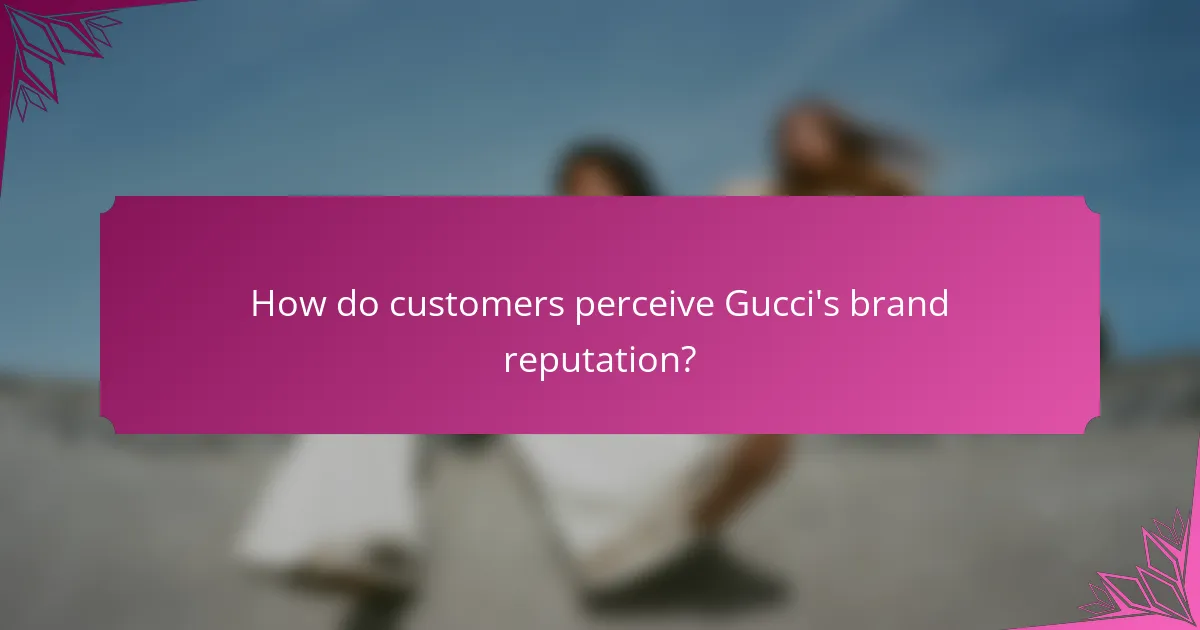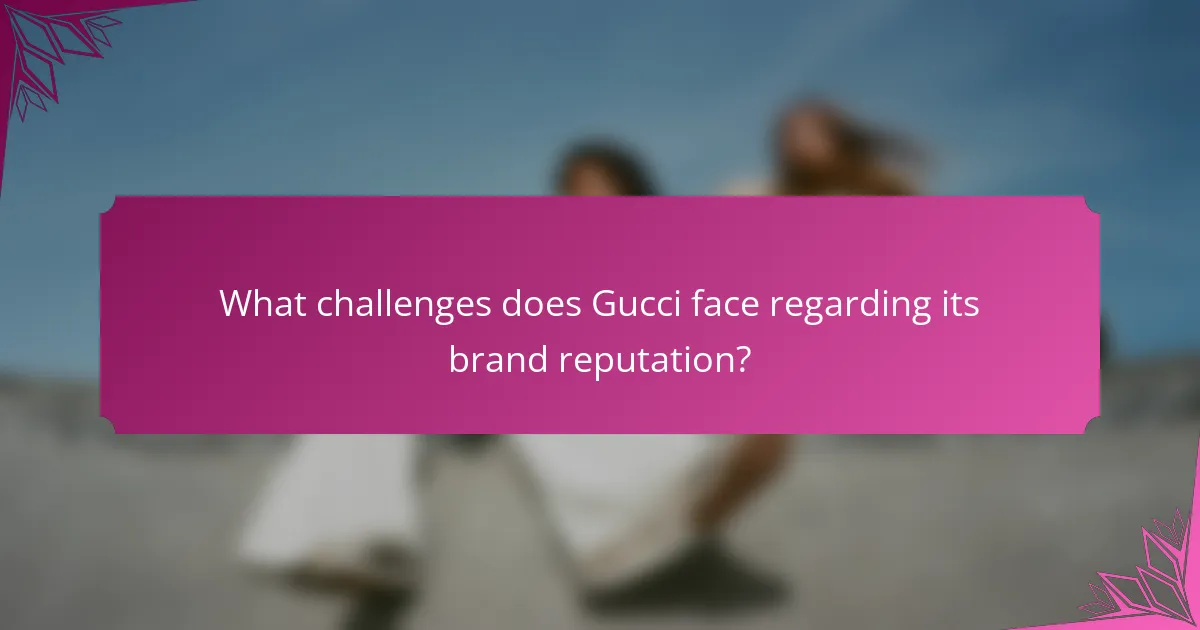Gucci is a prominent luxury fashion brand known for its exceptional craftsmanship, rich heritage, and exclusivity. Established in 1921, Gucci has built a legacy characterized by high-quality materials, meticulous attention to detail, and the iconic GG logo, which symbolizes status and prestige. The brand’s reputation is further enhanced by strategic collaborations with influential designers and innovative marketing tactics, including celebrity endorsements. However, Gucci faces challenges such as counterfeiting, maintaining exclusivity amid product line expansions, cultural appropriation controversies, sustainability concerns, and shifting consumer preferences towards authenticity and social responsibility. These factors collectively shape Gucci’s esteemed position in the competitive luxury market.

What defines Gucci’s brand reputation?
Gucci’s brand reputation is defined by its luxury craftsmanship, rich heritage, and exclusivity. The brand is renowned for high-quality materials and meticulous attention to detail. Gucci’s history dates back to 1921, establishing a legacy of luxury. The iconic GG logo symbolizes prestige and status. Collaborations with influential designers enhance its contemporary appeal. Limited product releases create a sense of exclusivity. Gucci is also recognized for its innovative marketing strategies, including celebrity endorsements. These elements collectively contribute to Gucci’s esteemed position in the luxury fashion market.
How does luxury craftsmanship contribute to Gucci’s reputation?
Luxury craftsmanship significantly enhances Gucci’s reputation. This is evident through their meticulous attention to detail and high-quality materials. Each Gucci product undergoes rigorous quality control. The brand employs skilled artisans who uphold traditional techniques. These practices ensure durability and exclusivity in their offerings. Gucci’s commitment to craftsmanship is reflected in their heritage. The brand has a longstanding history of luxury since its founding in 1921. This legacy attracts discerning customers who value quality. Ultimately, luxury craftsmanship solidifies Gucci’s position as a leader in the high-fashion industry.
What materials and techniques are used in Gucci’s craftsmanship?
Gucci’s craftsmanship employs high-quality materials and intricate techniques. The brand uses premium leather, including full-grain and suede, known for durability and luxury. Additionally, Gucci incorporates textiles like silk, cotton, and wool to enhance the elegance of its products. The brand utilizes artisanal techniques such as hand-stitching, which ensures precision and quality. Furthermore, Gucci employs innovative methods like digital printing for unique designs. Each piece often features distinctive elements like the iconic GG logo and unique patterns. These materials and techniques are integral to Gucci’s reputation for luxury craftsmanship.
How does Gucci ensure quality in its products?
Gucci ensures quality in its products through meticulous craftsmanship and stringent quality control measures. Each item undergoes a detailed inspection process at multiple stages of production. Skilled artisans handcraft products using high-quality materials, ensuring durability and luxury. Gucci sources premium leather and textiles, which contribute to the overall excellence of each piece. The brand also maintains a limited production approach to uphold exclusivity. Additionally, Gucci invests in training artisans to refine their skills over time. This commitment to quality is reflected in the brand’s long-standing reputation for luxury and craftsmanship.
Why is heritage important to Gucci’s brand identity?
Heritage is crucial to Gucci’s brand identity because it embodies the brand’s history and craftsmanship. Founded in 1921, Gucci has built a legacy of luxury and quality. This historical background influences its design philosophy and product offerings. Gucci’s heritage is reflected in its iconic products, such as the GG logo and green-red-green stripe. These elements connect the brand to its Italian roots and artisanal craftsmanship. The brand frequently references its past in marketing campaigns to reinforce authenticity. Heritage also differentiates Gucci in the competitive luxury market, appealing to consumers seeking prestige. By honoring its heritage, Gucci maintains a strong emotional connection with its audience.
What historical events have shaped Gucci’s brand heritage?
Gucci’s brand heritage has been shaped by several key historical events. The establishment of Gucci in Florence in 1921 marked its inception as a luxury leather goods brand. The introduction of the iconic GG logo in the 1960s solidified its identity. The brand gained global recognition when it became a favorite among celebrities in the 1970s. The family feud and subsequent management changes in the 1980s affected its direction and branding. The revival under Tom Ford in the 1990s redefined Gucci’s image, emphasizing sensuality and modernity. The acquisition by Kering in 2004 further expanded its global reach. Each event contributed to Gucci’s reputation for luxury craftsmanship and exclusivity.
How does Gucci incorporate its heritage into modern designs?
Gucci incorporates its heritage into modern designs through the use of iconic motifs and craftsmanship. The brand often features its historical GG logo and green-red-green stripe. These elements evoke the brand’s legacy while appealing to contemporary tastes. Additionally, Gucci employs traditional Italian craftsmanship techniques in its production. This commitment to quality connects modern products to the brand’s rich history. Collaborations with artists and designers also blend heritage with modern creativity. For instance, Alessandro Michele’s leadership has revitalized vintage aesthetics in current collections. This approach maintains Gucci’s relevance in today’s fashion landscape while honoring its past.
What role does exclusivity play in Gucci’s brand perception?
Exclusivity significantly enhances Gucci’s brand perception. It creates a sense of rarity and desirability among consumers. Limited product releases and high price points reinforce this exclusivity. Such strategies position Gucci as a luxury brand. This perception attracts affluent customers seeking unique items. Gucci’s collaborations with select artists further intensify this exclusivity. The brand often employs limited edition collections to maintain its allure. As a result, exclusivity becomes a key factor in consumer loyalty and brand prestige.
How does Gucci create a sense of exclusivity for its customers?
Gucci creates a sense of exclusivity for its customers through limited product releases. The brand often produces items in small quantities. This strategy enhances desirability and urgency among consumers. Gucci also employs high pricing strategies to reinforce its luxury status. Exclusive collaborations with renowned artists and designers further elevate its unique appeal. The brand maintains a selective distribution network, selling products only in high-end retail locations. Additionally, Gucci’s rich heritage and craftsmanship are emphasized in marketing. This combination of factors solidifies the brand’s exclusive image in the luxury market.
What impact does limited availability have on Gucci’s brand image?
Limited availability enhances Gucci’s brand image by reinforcing its exclusivity. This strategy creates a perception of luxury and desirability. Consumers often associate scarcity with higher value. Limited product releases generate buzz and anticipation among customers. This approach fosters a sense of urgency to purchase. According to a study by the Journal of Marketing Research, scarcity increases perceived value. Gucci’s limited edition collections often sell out quickly, demonstrating consumer demand. The brand’s image as a status symbol is solidified through this exclusivity.

How do customers perceive Gucci’s brand reputation?
Customers perceive Gucci’s brand reputation as synonymous with luxury and high fashion. The brand is recognized for its premium craftsmanship and distinctive designs. Gucci’s heritage, dating back to 1921, adds to its prestige. Many customers associate Gucci with exclusivity, often viewing it as a status symbol. According to a 2021 survey by Statista, 65% of consumers believe Gucci represents luxury. Additionally, Gucci’s collaborations and innovative marketing strategies enhance its appeal. The brand’s commitment to sustainability has also positively influenced customer perceptions. Overall, Gucci maintains a strong reputation in the luxury market.
What factors influence customer perceptions of Gucci?
Customer perceptions of Gucci are influenced by brand heritage, craftsmanship, exclusivity, and marketing strategies. Gucci’s rich history as a luxury brand, established in 1921, contributes significantly to its prestige. The high-quality materials and meticulous craftsmanship enhance the brand’s reputation for luxury. Exclusivity is a key factor; limited edition items and high price points create a sense of rarity. Additionally, Gucci’s innovative marketing campaigns and collaborations with celebrities shape public perception. Social media presence also plays a role in influencing customer views, with platforms showcasing the brand’s lifestyle appeal. Overall, these factors collectively shape how customers perceive Gucci as a luxury brand.
How do social media and celebrity endorsements affect Gucci’s reputation?
Social media and celebrity endorsements significantly enhance Gucci’s reputation. These platforms allow Gucci to reach a broader audience rapidly. Celebrity endorsements create aspirational value associated with the brand. High-profile figures like Harry Styles and Billie Eilish often wear Gucci, increasing its visibility. Social media engagement fosters a sense of community among fans. Positive user-generated content amplifies brand perception. In 2021, Gucci’s Instagram followers surpassed 50 million, showcasing its online influence. This digital presence is crucial for maintaining relevance in the luxury market.
What customer demographics are most attracted to Gucci?
Gucci attracts affluent customers primarily aged 25 to 45. This demographic often includes young professionals and millennials. They are typically fashion-conscious individuals who value luxury and exclusivity. Many customers are urban dwellers with disposable income. A significant portion of Gucci’s clientele is female, although male customers are increasingly prominent. The brand also appeals to international customers, particularly from Asia and Europe. According to a 2021 report, 60% of Gucci’s sales come from younger consumers. This trend highlights the brand’s successful engagement with a modern, youthful audience.
Why do customers choose Gucci over other luxury brands?
Customers choose Gucci over other luxury brands due to its strong brand reputation. Gucci is known for exceptional craftsmanship, blending traditional techniques with modern design. The brand’s rich heritage dates back to 1921, establishing a legacy of luxury. Gucci’s exclusivity enhances its desirability among consumers. Limited edition items and high-profile collaborations create a sense of urgency and prestige. The brand’s iconic status is reinforced through celebrity endorsements and cultural relevance. This combination of quality, history, and exclusivity makes Gucci a preferred choice among luxury shoppers.
What unique attributes set Gucci apart from its competitors?
Gucci’s unique attributes include its rich heritage, distinctive design elements, and commitment to craftsmanship. The brand was founded in 1921, establishing a legacy of luxury. Gucci is known for its iconic motifs, such as the interlocking G logo and the green-red-green stripe. These elements create a recognizable aesthetic that stands out in the luxury market. Additionally, Gucci emphasizes artisanal craftsmanship, with many products made by skilled artisans. The brand also embraces innovation, frequently collaborating with contemporary artists and designers. This blend of tradition and modernity enhances its appeal. Gucci’s limited product releases create a sense of exclusivity, further distinguishing it from competitors. These attributes collectively solidify Gucci’s position as a leader in luxury fashion.
How does brand loyalty manifest among Gucci customers?
Brand loyalty among Gucci customers manifests through consistent repeat purchases and strong emotional connections. Customers often express a preference for Gucci products over competitors. This loyalty is reinforced by the brand’s heritage and luxury craftsmanship. Many customers identify with the brand’s status and exclusivity. Research indicates that 70% of luxury consumers remain loyal to specific brands. Gucci’s limited product releases further enhance this loyalty by creating a sense of urgency and desirability. Social media engagement also plays a significant role in maintaining customer loyalty. Consumers often share their Gucci experiences online, fostering a community around the brand.

What challenges does Gucci face regarding its brand reputation?
Gucci faces several challenges regarding its brand reputation. One major challenge is counterfeiting. The luxury market is heavily affected by fake products, undermining brand value. Another challenge is maintaining exclusivity. As Gucci expands its product lines, it risks diluting its luxury image. Additionally, Gucci has faced criticism for cultural appropriation. Controversial designs have sparked backlash from various communities. The brand also grapples with sustainability concerns. Consumers increasingly demand ethical practices in luxury fashion. Finally, shifting consumer preferences pose a challenge. Younger generations prioritize authenticity and social responsibility. These factors collectively impact Gucci’s brand reputation in the competitive luxury market.
How do counterfeit products affect Gucci’s brand image?
Counterfeit products negatively impact Gucci’s brand image by diluting its luxury status. The presence of fakes creates confusion among consumers regarding authenticity. This confusion can lead to diminished trust in the brand. Gucci’s exclusivity is compromised when counterfeit items flood the market. The brand’s perceived value decreases as consumers may associate it with lower quality. Studies show that luxury brands lose significant revenue due to counterfeiting. For instance, the International Chamber of Commerce estimated that counterfeiting costs the global economy $1.8 trillion annually. These factors collectively harm Gucci’s reputation as a premier luxury brand.
What measures does Gucci take to combat counterfeiting?
Gucci employs several measures to combat counterfeiting. The brand utilizes advanced technology for product authentication. This includes unique serial numbers and holograms on their items. Gucci also collaborates with law enforcement agencies worldwide. They actively monitor online marketplaces for counterfeit goods. Additionally, they conduct regular training for their staff on identifying fakes. Gucci invests in legal actions against counterfeiters to protect their brand. These strategies reinforce their commitment to maintaining brand integrity and exclusivity.
How do counterfeit products impact customer trust in Gucci?
Counterfeit products significantly undermine customer trust in Gucci. When consumers encounter fake Gucci items, they often question the authenticity of the brand. This skepticism can diminish the perceived value of genuine Gucci products. A study by the European Union Intellectual Property Office found that 80% of consumers believe counterfeit goods harm brand reputation. Additionally, counterfeit products can lead to negative experiences, such as poor quality and customer service issues. These experiences further erode trust in the brand. Ultimately, counterfeit goods create a challenging environment for luxury brands like Gucci, impacting customer loyalty and brand integrity.
What criticisms has Gucci faced in recent years?
Gucci has faced several criticisms in recent years, primarily related to cultural appropriation and sustainability issues. The brand has been accused of appropriating elements from various cultures without proper acknowledgment. This has sparked backlash from communities who feel misrepresented. Additionally, Gucci has received criticism for its environmental impact and lack of transparency in production practices. Activists have called for more sustainable practices within the luxury fashion industry. In 2019, Gucci pledged to become more sustainable, yet critics argue that progress has been slow. The brand’s high-profile collaborations and marketing campaigns have also faced scrutiny for being tone-deaf or insensitive. These criticisms highlight ongoing challenges in balancing luxury branding with social responsibility.
How does Gucci respond to criticism regarding cultural appropriation?
Gucci addresses criticism regarding cultural appropriation by emphasizing inclusivity and collaboration. The brand often engages with diverse cultural influences in its designs. Gucci has collaborated with various artists and communities to create collections that celebrate heritage. These collaborations aim to honor the cultures represented rather than exploit them. For instance, Gucci’s partnership with Harlem’s Fashion Row highlighted Black designers and their contributions. The brand also publicly acknowledges the origins of cultural elements in its collections. This approach demonstrates Gucci’s commitment to respectful representation in fashion.
What steps is Gucci taking to improve sustainability and ethical practices?
Gucci is implementing multiple strategies to enhance sustainability and ethical practices. The brand has committed to using 100% sustainably sourced materials by 2025. This includes organic cotton, recycled polyester, and eco-friendly leather alternatives. Additionally, Gucci launched the “Gucci Equilibrium” initiative. This program focuses on environmental and social impact. It aims to reduce the brand’s carbon footprint and promote diversity and inclusion. Gucci also emphasizes transparency in its supply chain. The brand discloses information about its suppliers and production processes. Furthermore, Gucci has partnered with organizations like the World Wildlife Fund. This collaboration supports conservation efforts and sustainable practices. These steps reflect Gucci’s dedication to responsible luxury.
What best practices can Gucci adopt to enhance its brand reputation?
Gucci can enhance its brand reputation by focusing on sustainability and ethical practices. Implementing eco-friendly materials in production can attract environmentally conscious consumers. Transparency in supply chain operations builds trust with customers. Engaging in community initiatives demonstrates social responsibility. Collaborations with artists and influencers can refresh brand image and reach new audiences. Consistent quality in craftsmanship reinforces luxury perception. Leveraging digital platforms for storytelling can deepen consumer connection. Regularly conducting consumer feedback surveys helps adapt to changing preferences.
How can Gucci strengthen its customer engagement strategies?
Gucci can strengthen its customer engagement strategies by enhancing personalized experiences. Tailoring communications and offerings to individual customer preferences fosters deeper connections. Implementing data analytics can help understand customer behavior and preferences effectively. Engaging customers through exclusive events and collaborations can create a sense of belonging. Utilizing social media platforms for interactive campaigns increases brand visibility and customer interaction. Offering loyalty programs with unique rewards can incentivize repeat purchases. Regular feedback loops through surveys can help Gucci adapt to customer needs. These strategies align with Gucci’s focus on luxury and exclusivity, reinforcing its brand reputation.
What role does innovation play in maintaining Gucci’s luxury status?
Innovation is crucial for maintaining Gucci’s luxury status. It allows the brand to adapt to changing consumer preferences. Gucci integrates modern technology in design and production. This enhances product quality and uniqueness. Collaborations with contemporary artists also keep the brand relevant. Innovative marketing strategies attract younger demographics. For instance, Gucci’s use of social media campaigns engages a broader audience. The brand’s commitment to sustainability reflects innovation in ethical luxury. These efforts reinforce Gucci’s position as a leader in the luxury market.
Gucci is a luxury fashion brand known for its exceptional craftsmanship, rich heritage, and exclusivity. The article examines how these elements contribute to Gucci’s esteemed brand reputation, detailing the high-quality materials, meticulous techniques, and historical significance that define its products. It also explores the impact of exclusivity and innovative marketing strategies on consumer perceptions, as well as the challenges Gucci faces, including counterfeiting and sustainability concerns. Additionally, the article highlights best practices for enhancing brand reputation and customer engagement in the competitive luxury market.




